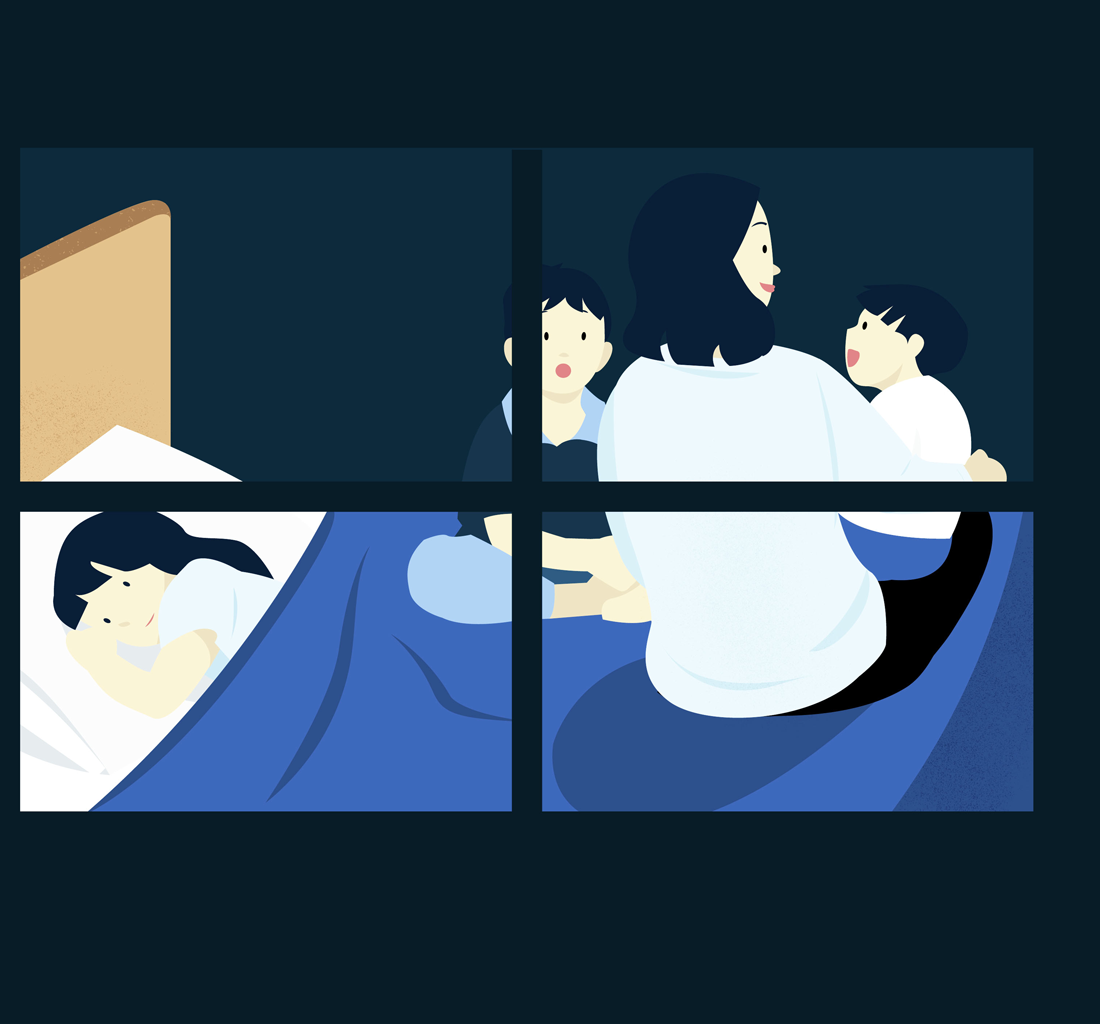




I have three: Shengyeng, Thayeng, and Yupheng. Shengyeng is six. A little girl with bangs across her brows, eyes the color of seagrass in turbulent water. Thayeng and Yuepheng are identical twin boys who are four. They are little alike to the people who know them best though both have smiles that show their white teeth, spaces in between, eyes crinkling at the corners, hair cut short. When the light has left the sky and they are bathed and brushed, we gather in my bed. There’s one on either arm and another on top of me. The weight of who they are push into my limbs and my chest and I’m anchored in a way that is impossible through the day. Every night, they ask me for a story.

They like the stories from my past, when I was their age, a little girl in the refugee camps of Thailand. A little girl who needed to pee and poop in the night, but was afraid of the dark and the glowing eyes of the hungry dogs that lurked beneath the patios of the sleeping quarters. Or the medium-sized girl on her way to America, who had seen a dead body and fallen in front of it, who could no longer sleep in the dark for fear that the dead woman would come and take her into worlds beyond the one she knew best, so each night, she’d cry until her father took her outside, gather her into the crook his arm, and allow her to sleep beneath the lights of the shining stars. Or the large-sized girl in America who used to trap birds with her big sister beneath the top grill of a charcoal cooker and then cook them up in soups with lemongrass and Thai chilis. The children try to resolve my fears for me, they try to settle me into rest, they ponder the taste of common swallows in spicy, scented broth.
Lately though, they’ve been distracted during our evening cuddles, full of energy they haven’t quite released during the day—even though we make sure to dress them up warmly and open the door for them to play in our backyard with the sticks that have been unearthed by the warming weather, the bits of green grass in between the yellow, the heads of the strawberry plants peeking through the dry leaves of the fall. The new schedule and confines of our lives have them kicking at each other and me. They toss their hands like ghosts in the mix of the sheet and the blanket. To gather them around, to garner their attention, my stories have to be theirs.
In a green house with big windows on the edge of a city called St. Paul, not far from a beautiful park with a big, haunted lake, there lived a sister, her two brothers, and their parents. The kids’ names were Shengyeng, Thayeng, and Yuepheng. They were your average kids. Shengyeng liked BTS, the Korean boy band, with RM as their lead. Thayeng liked dough, playing with it, cooking it, turning it into things edible and not. Yuepheng was an artist; he drew and drew and made books with incredible titles like “It was a sad day” and “Fact Notes about Sharks”. One bright day, after the excitement of the new year, before springtime could visit, the sister and brothers learned about the Coronavirus, a sickness that was spreading from one human animal to the other. In the green house, the Mom and Dad were often worried, talking about numbers, looking at phones, and holding, holding themselves, each other, and their babies close.

The Mom and Dad had forgotten how to have fun. Oh, this was the worst thing that could happen in the green house. When the Mom and Dad forgot to have fun, it fell upon the children to make fun. They made fun with experiments. They filled spice bottles up with water and sprinkled it on bread, cookies, and crackers like sauces. They scrunched papers all around the living areas to see if they could swim in them. They found tape and taped things together that often don’t belong together, like a box of Kleenex and a spatula. They taped themselves together, at first giggling and then crying when they couldn’t free themselves. Each time the cries (or the giggles) grew too loud, the Mom and Dad would suddenly put down their phones and look around them as if they were waking up for the first time. The children became the alarm clocks for fun in the house.
My stories make my children happy. They smile and laugh. They can’t quite believe how three children with their names could be such things as alarm clocks for fun. They beep. They siren. They cough. They do all of this in the name of awakening fun. When their father comes for them, they tell him, “Momma told a story about us, our lives in the time of the Coronavirus!”—and I’m happy.



Read More
Kao Kalia Yang’s story is part of Pollen’s “Are You OK?” initiative, a collection of stories, art, and virtual gatherings that documents how our collective community is processing and healing during the this global health and financial crisis. Check the collection regularly to hear from our creative community as we keep up with the changes and challenges before us.
Contributors
We ask that you support these artists by donating to their listed Paypal/Venmo accounts.